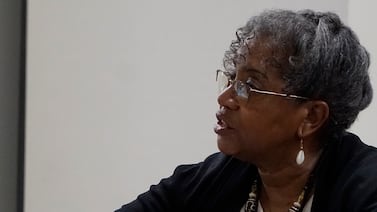Public health, explained: Sign up to receive Healthbeat’s free New York City newsletter here.
There’s something about the relationship between clients and their barbers and stylists. It can be a close, trusting bond – one that can create opportunities to identify signs of abuse.
Some state lawmakers want New York to join other states in mandating training in domestic violence and sexual harassment prevention as part of the licensing requirements for cosmetologists and barbers.
“This unique relationship creates an opportunity for them to play a role in identifying and responding to signs of abuse,” said Assemblywoman Rebecca Kassay, a Suffolk County Democrat who co-sponsored a bill in the General Assembly to require the training. “We know that domestic violence and sexual assault are vastly underreported crimes — too often hidden in silence due to factors ranging from fear and stigma, to lack of access to support.”
Between 2019 and 2022, the number of domestic violence cases increased by 8.5% in New York City and 8.7% across the rest of the state, according to an analysis by the state comptroller’s office. A Centers for Disease Control and Prevention initiative to gather detailed national and state data on intimate partner violence found that 1 in 4 women and 1 in 10 men have experienced sexual and/or physical violence and stalking by an intimate partner during their lifetime.
The proposal’s advocates believe the intimate setting of a salon can nurture honest, vulnerable conversations that can lead to support.
“As a professional barber in New York City, we frequently serve not just as grooming professionals, but also as confidants, sometimes stepping into roles that resemble informal therapists or counselors,” said Michael DiGregorio, a barber at Chaps & Co. Barbershop NYC. “Having some foundational knowledge in handling sensitive issues may not be a bad idea. It would help us offer better support and be a more positive influence on those who open up to us about personal matters.”
New York requires aspiring barbers and hairdressers to complete several hours of training and pass several exams to become licensed. Some other states, including Illinois, Tennessee, Arkansas, and Washington, have added domestic violence prevention training to their licensing requirements.
“That hair salon chair makes people more relaxed, and they can open up about what is happening in their lives,” said Luis Burgos, director and founder of the Chicago-based nonprofit Don’t Forget About Me, which focuses on wellness for survivors of trauma. “For some people, it is embarrassing to admit that their relationship did not go well, or they are going through something. Showing empathy is a human connection that we can all learn.”
Burgos started the organization after Hurricane Maria hit Puerto Rico in 2017. He now works alongside volunteer hairstylists, nail technicians, massage therapists, and makeup artists in Chicago, New York, and Puerto Rico to provide care for survivors of traumatic experiences. Over the past few years, he has listened to and supported clients who have survived abuse.
New York’s proposal would train aspiring hairdressers and barbers to not only recognize indicators of domestic violence and sexual harassment, but also to connect people with resources.
The New York bill likely won’t pass the current legislative session, which ends Thursday, but national momentum is growing for the idea.
Salons against Domestic Violence was formed in 2004 to train barbers and hairdressers to recognize warning signs. Programs like Cut It Out provide online training to makeup and salon professionals, as well as flyers that can be posted in salons.
Salon professionals recognize they can have a role in identifying sex trafficking and intimate partner violence and responding to abuse and exploitation, according to a Purdue University study published in March.
Through surveys and personal stories in that study, 334 salon professionals in Indiana said they want better training. Specifically, they need help learning how to talk with clients who may be experiencing abuse, how to respond appropriately, and what steps to take without overstepping. They also said it’s important to work with police and local organizations, like domestic violence shelters or crisis hotlines, so that clients can get help quickly and easily.
Most agreed that training on issues like domestic violence and sex trafficking is necessary across the beauty industry. About 64% supported the idea of making the training mandatory for getting licensed. Some professionals said they would be more likely to take part in training if it were offered virtually, due to busy schedules.
Kathryn Seigfried-Spellar, a co-author of the study, said, “We developed an online training with modules. That way they could complete when they had time, then do a quiz before they moved on to the next module.”
Since 2018, the NYC Mayor’s Office to End Domestic and Gender-Based Violence has run a voluntary program that provides prevention education to the city’s cosmetologists and barbers, who can receive an Intimate Partner Violence 101 training in Spanish or English. But outreach to cosmetologists has decreased over the past few years.
“Outreach efforts never fully stopped, they’ve slowed due to reduced capacity following team restructuring,” said Tesa Arózqueta, deputy commissioner of community initiatives and external affairs at ENDGBV. “Additionally, outreach has become more challenging as the field is now saturated — many cosmetology businesses already receive mandated training through corporate trainers or other community organizations whom we still work with.”
Advocates and researchers say teaming up with community groups to make the case for the required training, backed up by research, could help get the bill passed eventually.
If you or someone you know is experiencing domestic or intimate partner violence, contact the National Domestic Violence Hotline at 1-800-799-SAFE (7233), or visit thehotline.org for confidential support, resources, and live chat assistance 24/7.
This story was produced in partnership with the Health & Science Reporting Program at the Craig Newmark Graduate School of Journalism at CUNY.







